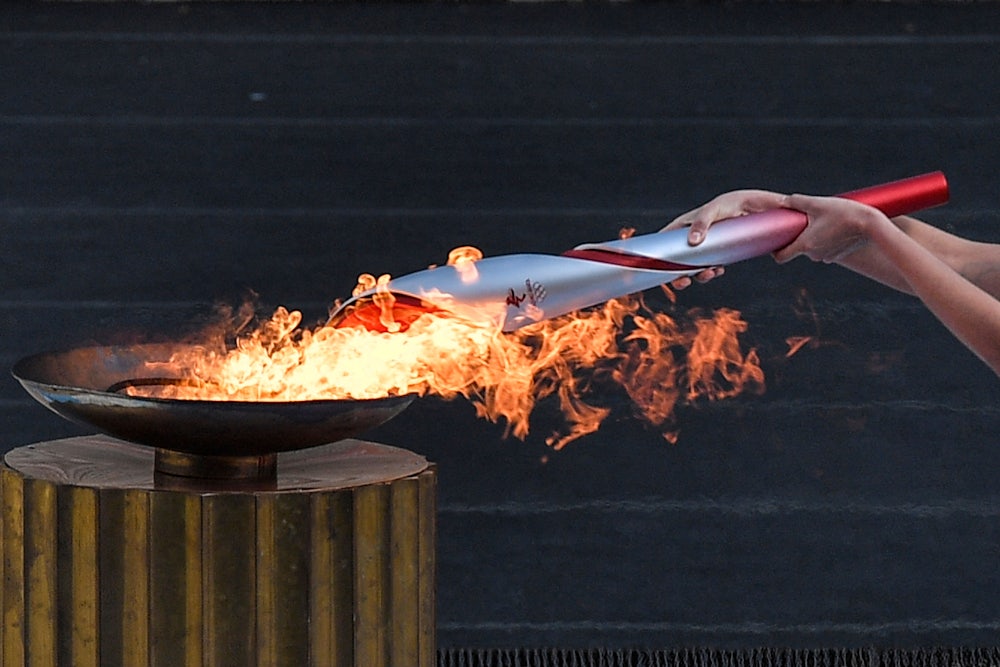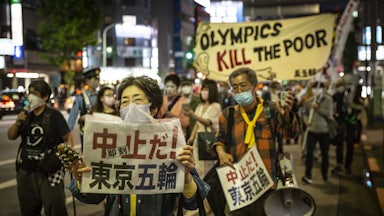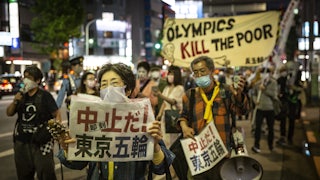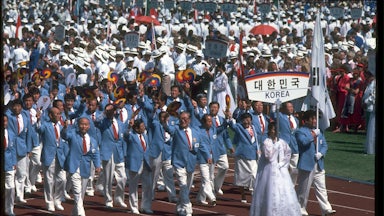In the coming days, President Joe Biden is “expected to announce” that the administration will be imposing a diplomatic boycott of the 2022 Winter Olympics in Beijing, China, as “a way to respond to the Chinese government’s human rights abuses.” What this means in practice is that come February, the president and other government officials will not attend or send a delegation to the games, though U.S. athletes will likely still travel and compete in Beijing. The administration has ample cause to act against these abuses, not the least of which is China’s ongoing policy of genocide against the Uyghurs, a majority-Muslim ethnic minority who populate the northwest part of the nation.
It would seem for the moment that a full U.S. boycott of the games is not in the cards. But the partial boycott raises some larger questions about how a regime like China won the honor of hosting one of international sports’ grandest events in the first place. The discomfiting truth we will learn, of course, is that the games themselves are complicit.
How did Beijing wind up being selected for the 2022 games? The short answer is that no one else wanted to host. As Deadspin’s Barry Petchesky reported in 2014, the International Olympic Committee, or IOC, had wooed a number of different host nations, including Sweden, Germany, Switzerland, Poland, and Norway. One by one, these nations declined, as their citizens swung heavily against the games, citing, among other things, the massive cost overruns associated with holding them. “When actual citizens are allowed to have a say,” Petchesky summarized, “they say they don’t want the Olympics.” After Russia invaded Ukraine, leaving a proposal from Lviv to host the games imperiled, that left China and Caspian petrochemical dictatorship Kazakhstan as the remaining live bids.
Maybe it was in that moment we should have realized that the Olympics have a dire future. As nominally democratic nations come to grips with the abundant reasons to avoid hosting the games—which TNR’s Natalie Shure deftly enumerated back in July—and opt out, autocracies and corrupt states will naturally fill the void. These nations, lacking the scruples that might otherwise prevent them from abusing their own people, will only entrench the abuses of the games themselves.
But if you think that the Olympics’ august governing body might pull itself out of this trajectory, think again. The IOC, which TNR editor-at-large Chris Lehmann described as a “mobbed up oligarchy” for The New York Observer in 2012, has long been a haven for scoundrels. And while they might have preferred these Winter Games to go to a stylish Nordic democracy, they knew exactly what they were getting with China as host: In the lead-up to the 2008 Summer Olympics, China demonstrated its commitment to the IOC’s aims by forcibly displacing 1.5 million residents of Beijing to make room for the games, as Reuters’ Lindsay Beck reported back in 2007. This is the kind of can-do attitude that the IOC either treats as a kindness or, at the very least, endeavors to forget. One extreme example of this tendency to look the other way occurred in 2019, when two Japanese women were displaced from their homes to make way for the 2020 Tokyo Games, 55 years after being evicted to make way for the 1964 edition.
The IOC rather consistently treats the residents of host nations as dispensable, happily uprooting their lives for the enjoyment of the committee’s top brass. Vice sports reporter Aaron Gordon spent his time at the Rio Games in 2016 observing the sacrifices residents were forced to make for the committee’s grandees. “It was the way that nothing else in Rio worked as it was supposed to, except the things that touched the IOC, then everything seemed like clockwork,” he told authors Kavitha Davidson and Jessica Luther in their book Loving Sports When They Don’t Love You Back. “The [IOC] and its members feel no remorse, no obligation, and no dedication to improving the lives of the people in the city that they profit off,” he added.
The Olympics are in a doom loop: Their governing body essentially treats the abuses and impositions meted out to the residents of host cities as a given. As those residents wise up and keep the games from their homes, the only places left will be nations that don’t let principles get in the way of a massive cash grab.
Come 2028, the Olympics will head to Los Angeles. And despite the U.S. registering its displeasure with China, at least symbolically, I have little faith that our leaders won’t indulge in the same abuses that have become synonymous with the games in recent decades (especially if a certain former president swings reelection in 2024). I am eager to be proven wrong, however. We certainly have it in our power to break this terrible cycle and help plot the future of a more just Olympics. Having thrown down a gauntlet in the form of a diplomatic boycott of the Beijing Games, we are, in fact, obligated to try.
This article first appeared in Power Mad, a weekly TNR newsletter authored by deputy editor Jason Linkins. Sign up here.










